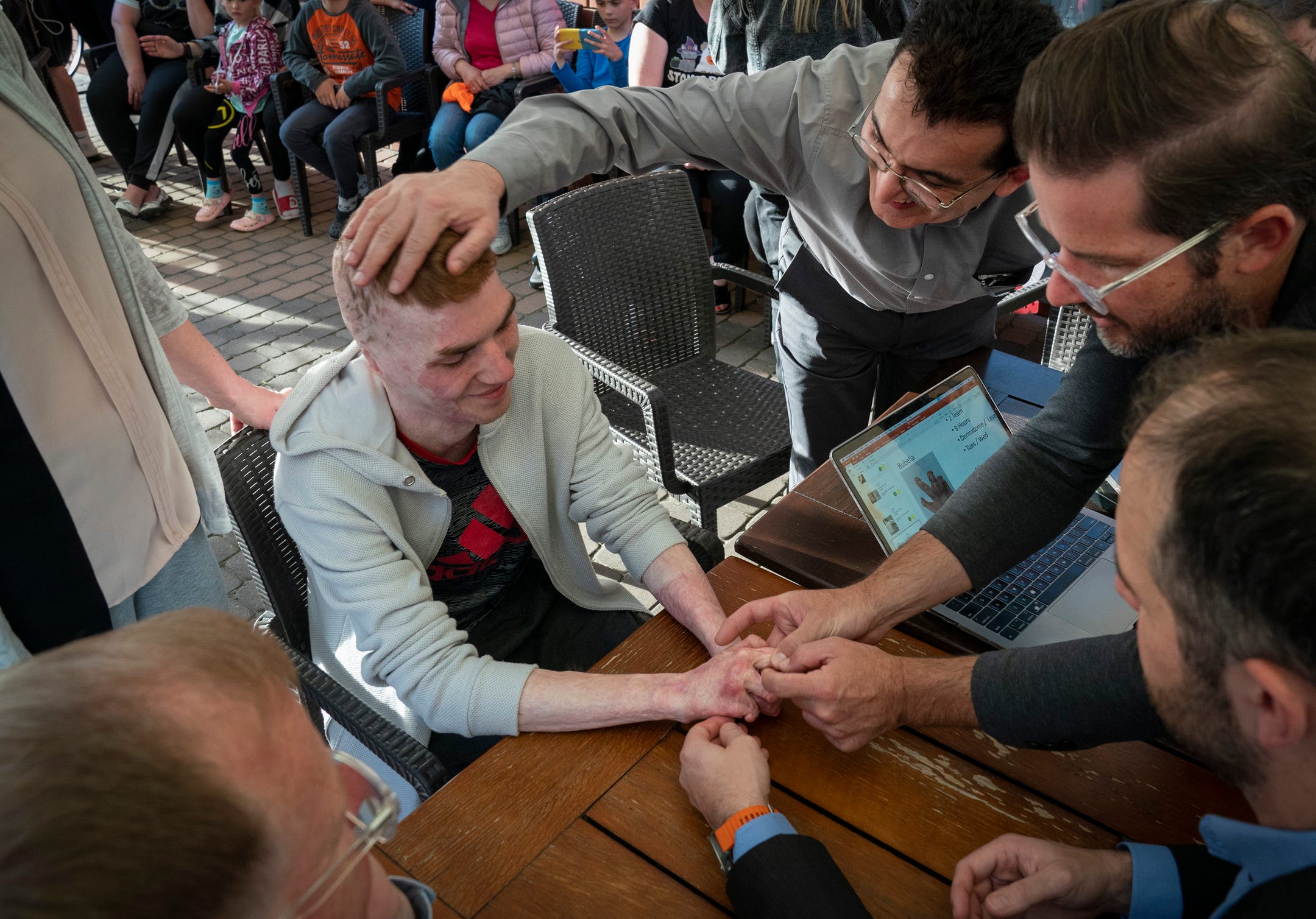
Dr. David Brown, a plastic surgeon from the University of Michigan, left, helps to screen Volodymyr Bubela, 17, of Lviv, Ukraine Sunday, May 14, 2023 on a hotel patio in Leczna, Poland. Brown was joined with Doctors Collaborating to Help Children Founder Dr. Gennadiy Fuzaylov, Dr. Shawn Diamond an Assistant Professor of Plastic Surgery at Texas Tech in El Paso and Dr. Brian Kelley, a plastic surgeon at the University of Texas at Austin Dell Medical School. Bubela was severely burned at the age of 7 in a barn fire and will have his hands operated on. Mandi Wright, Detroit Free Press
From victims of bomb injuries to prewar burns, 20 Ukrainian children travel to Poland for care that will help them continue to grow.
Dr. David Brown, a plastic surgeon from the University of Michigan, left, helps to screen Volodymyr Bubela, 17, of Lviv, Ukraine Sunday, May 14, 2023 on a hotel patio in Leczna, Poland. Brown was joined with Doctors Collaborating to Help Children Founder Dr. Gennadiy Fuzaylov, Dr. Shawn Diamond an Assistant Professor of Plastic Surgery at Texas Tech in El Paso and Dr. Brian Kelley, a plastic surgeon at the University of Texas at Austin Dell Medical School. Bubela was severely burned at the age of 7 in a barn fire and will have his hands operated on. Mandi Wright, Detroit Free Press
LECZNA, Poland – The children came by bus and by train, some traveling more than 24 hours to cross the border from Ukraine. They arrived to a Polish countryside abloom with rolling fields of bright yellow rapeseed, which, when juxtaposed against the brilliant blue sky, resemble the Ukrainian flag.
Among them was Artem Sokolov, 11, of Kharkiv, who was injured in a bomb blast, and Evheniia Ukhatova, 6, of Dnipro, whose feet and legs were so badly scarred by burns from a house fire that she struggled to walk.
Yelizaveta Nadolniak, 4, couldn’t raise her tiny arms all the way over her head because the burn scars that spanned the top of her body from wrist to wrist were contracting as she grew.
Volodymyr Bubela, 17, had difficulty using a spoon because of burns he suffered nine years earlier in a barn fire.
The volunteer doctors – the first American medical team to treat Ukrainian children in Poland since the Russian invasion began 15 months ago – came across the Atlantic from Michigan and Massachusetts, Texas and Missouri.
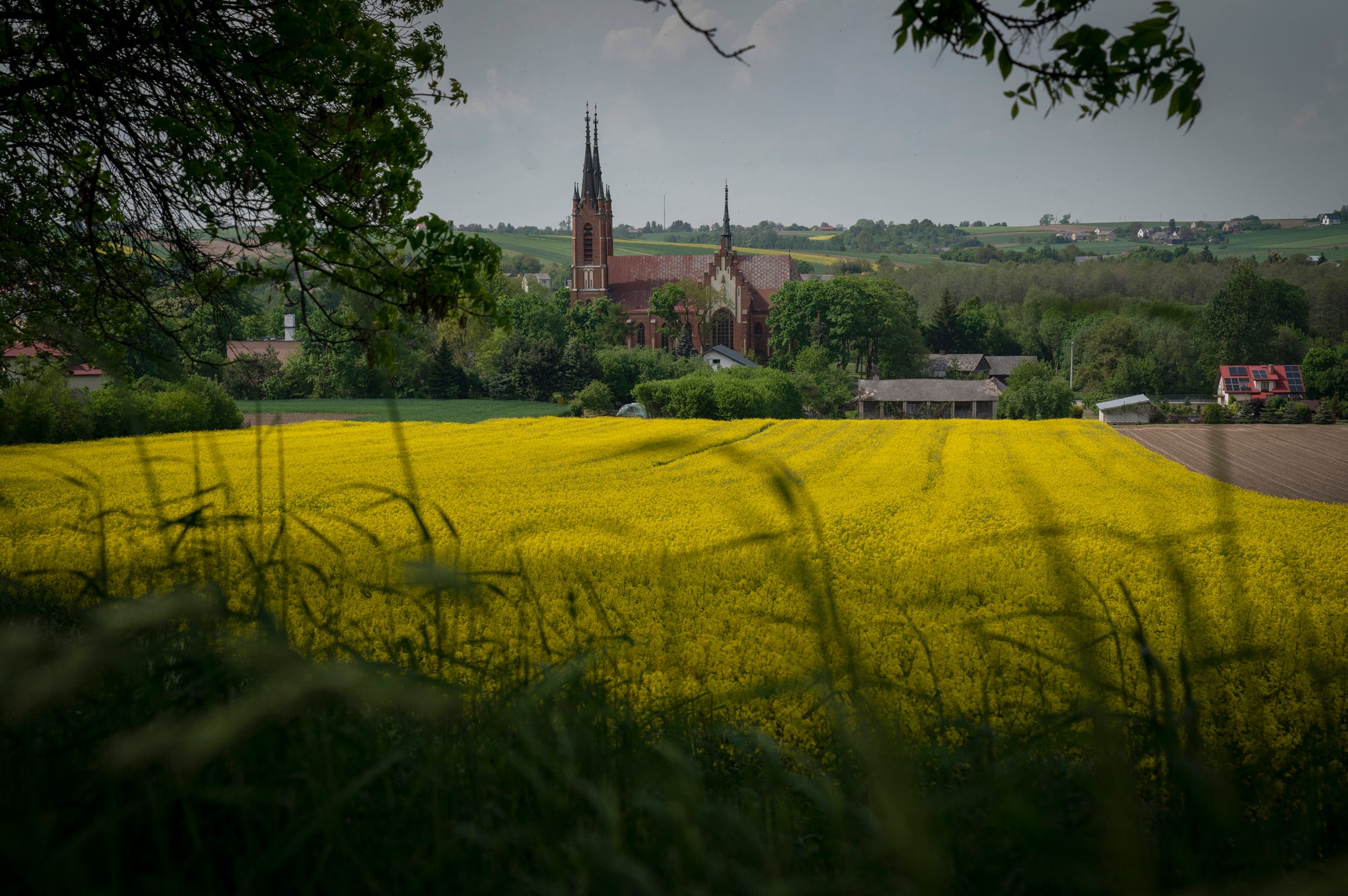
They converged in mid-May in this small town about 20 miles west of the Ukrainian border with a mission of providing reconstructive and cosmetic surgery to 20 children ages 2 to 19, scarred not just by burns and congenital anomalies but also by the trauma of war.
“We're all human. We all have a desire to help, and when you look at the context of what is happening right now … I feel like we are obligated to help them in the medical field to show them that we care,” said Dr. Gennadiy Fuzaylov, an assistant professor at Harvard Medical School and physician at Massachusetts General Hospital, who organized the medical mission.
'Let's help these kids ... I just need your blessing'
Fuzaylov, founder of the nonprofit Doctors Collaborating to Help Children, for more than a dozen years has organized annual trips to Ukraine to provide free reconstruction and plastic surgeries for kids like Artem, Evheniia, Yelizaveta and Volodymyr.
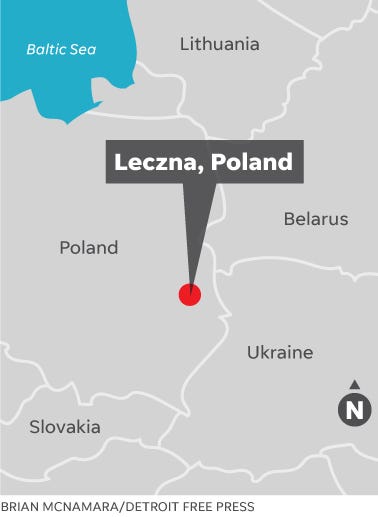
But it took a Herculean effort to organize this year's trip.
Seventeen of the children and their mothers or guardians had to be evacuated from Ukraine in the midst of war. They came from all corners of the sprawling country – from Mykolaiv and Mariupol in the south, Kharkiv in the east, Chernihiv in the north, Lviv in the west.
Three other children were Ukrainian refugees who had fled to other parts of Europe. Two already were living in Poland. Another child, a girl, lived in the Netherlands.
They all needed transportation to eastern Poland, along with travel documents, medical screening, housing and food on the trip.
“I talked with the U.S. ambassador to Poland. I talked with the Polish and Ukrainian Ministry of Health,” Fuzaylov said. “I had a meeting with the State Department. I kept calling and calling, and said: ‘Hey, guys. Let's do this together. Let’s help these kids together. … I just need your blessing.’ ”
Children of war: Doctors' mission to rescue severely burned Ukrainian kids
More: Michigan doctor collects medical supplies to help hospitals in Ukraine
Fuzaylov also had to raise significantly more money this year than for any other trip he’d planned to Ukraine.
“We've been fortunate to get donations that needed to triple this year to cover our costs, especially transporting the patients and housing the patients,” said Dr. David Brown, a plastic surgeon from the University of Michigan, who works closely with Fuzaylov on the mission trips.
“There are just lots of costs that tripled because of the change to a third country.”
These children 'have been through a lot of horrible things'
He arranged for medical licenses for each of the 11 members of the U.S. medical team so they could practice in Poland, along with hotel accommodations.
And Fuzaylov found an ally in Dr. Piotr Tomaka, deputy director of the Independent Public Health Care Facility in Leczna, a 400-bed hospital with one of the largest burn treatment centers in Poland.
Tomaka cleared the schedule for two of the hospital’s three operating rooms to make space for the children’s surgeries – reserving one room for local emergency cases.
“These are the children … who need it the most,” Tomaka said. “They have been through a lot of horrible things in their lives. They probably got hurt in the most cruel way that we can even imagine. A burn injury is the worst-case scenario.”
Fuzaylov's team was joined by about 20 Polish doctors and nurses, along with a group of Ukrainian physicians from Dnipro. Together, they performed dozens of complex plastic and reconstructive surgeries in the span of five days, learning from one another as they worked.
“This is tremendous collaboration with three different countries," Fuzaylov said.
A Ukrainian psychiatrist joined the journey as well, helping the children cope with their wounds – physical and psychological – as they grapple with their injuries, the fallout of war and fears of traveling through Ukraine at a time of escalating Russian missile strikes.
“I think the Polish nation understands perfectly how it is to live in a country at war,” Tomaka said. “So as soon as war started in Ukraine, our arms were open and we were very happy to help those people at least to the extent that we can.
“The Polish people provided shelter, food, medications, health care, anything that was … needed. And now, we are very happy that we're hosting people from Ukraine now. They are working in our country. So we are very happy to have them here as long as they need to stay here."
Playtime and surgical screening
Kids laughed and played with balloons last weekend outside the Secession Hotel, a yellow concrete four-story building with a terra cotta-colored roof less than 2 miles away from the hospital where they were to have surgery in the days ahead.
A playground across the street was full of kids swinging and tipping up and down on the teeter-totter and climbing on the jungle gym. A group of boys bounced a basketball in the parking lot.
In the back of the hotel, dozens of women and children sat on patio furniture beneath large white umbrellas on the brick paver terrace inside a busy square.
Putin 'won't stop' with Ukraine: Why Americans should care about Russia does
'Brothers': Russians, Ukrainians wage fragile peace at Winter Olympics amid threat of war
Many of the children had very obvious burn scars on their faces and necks, on their hands and forearms. For others, the signs of physical trauma were more hidden.
The U.S. doctors – Brown and Fuzaylov; Dr. Shawn Diamond, a plastic surgeon from Texas Tech in El Paso; Dr. Brian Kelley, a plastic surgeon from the University of Texas at Austin Dell Medical Center; and Dr. Eric Wenzinger, a medical resident at Massachusetts General Hospital – ran an outdoor mini-clinic to screen the children and finalize the surgery schedule.
Diamond had an open laptop in front of him, using it to pull up each child’s case file as they approached.
A boy's arm, ravaged by a Russian bomb
Artem Sokolov put his left arm on the table but didn’t make eye contact as he met the team of U.S. doctors.
His head hung low.
“He is a victim of the war,” Fuzaylov said.
Artem was injured in a bomb blast in June in his hometown, Kharkiv, in eastern Ukraine, said his mother, Hanna Sokolova. His left arm was ripped open in the attack, and Artem no longer has much function in his left hand. He can’t fully open or close it; nor can he point with his index finger.
The doctors tried to determine exactly what has been damaged.
When the doctors touched the scar on his forearm, Artem winced and said he felt a prickly, almost electric-shock type of sensation: a telltale sign of nerve damage.
Artem was anxious.
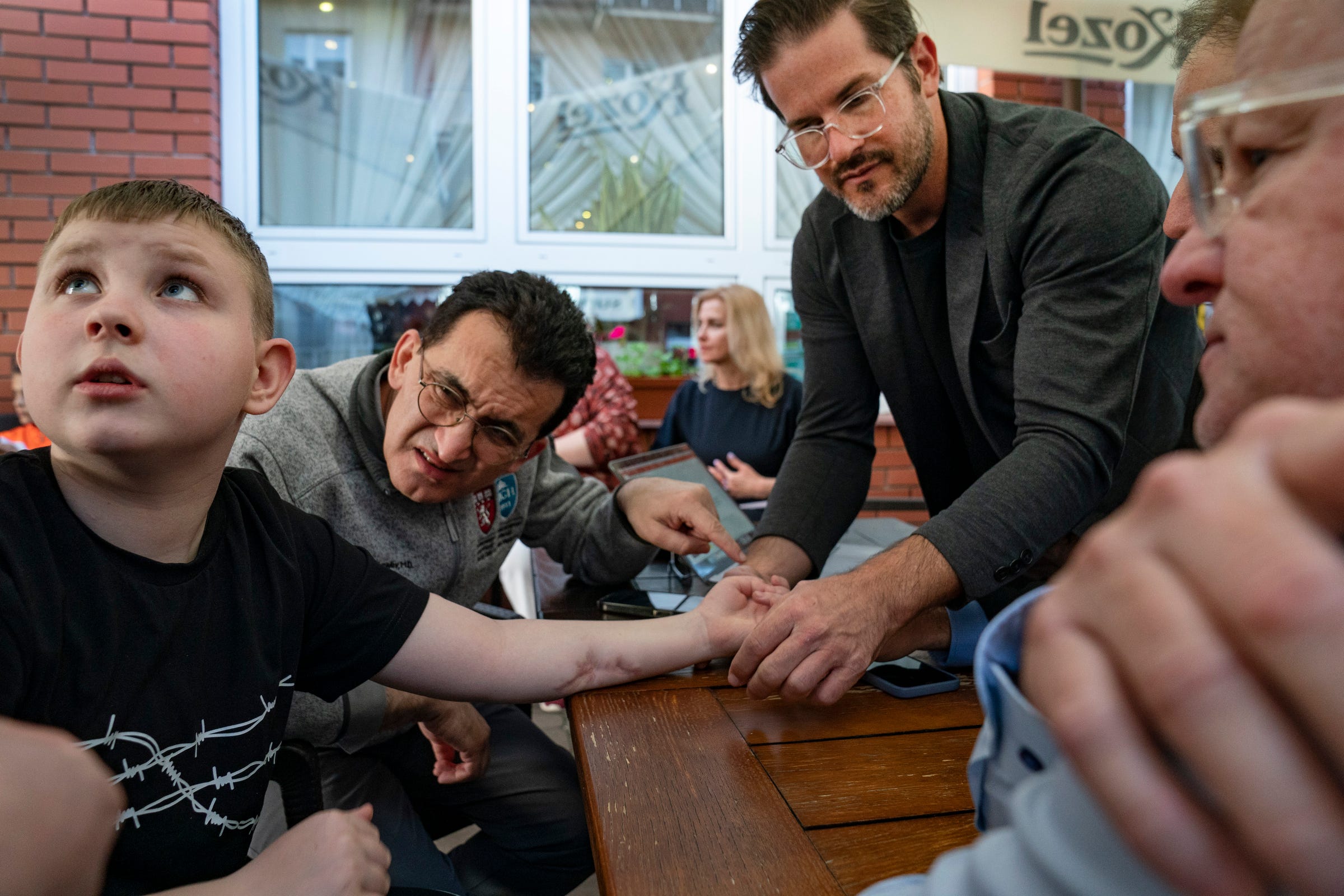
“He gets nervous when we ask him questions,” Fuzaylov said. “He is like shut down.”
Fuzaylov lightened the mood, and he said something quietly to Artem.
“I asked him if he has a girlfriend. Yes? Yes?” he asked.
Artem giggled, and the stress seemed to ease – at least for the moment.
Fear from the sound of a balloon popping
A little girl with long blond hair pulled into a high ponytail and secured with a green elastic band sits in the chair.
Her name is Yelizaveta Nadolniak, and she is 4 years old. Her aunt, Ludmila Nativa, has traveled to Poland with the girl, whom she calls Liza, from the southern city of Mykolaiv, which has been heavily attacked by Russian forces.
Nativa pulled Liza’s mint green shirt over her head, and the doctors examined the scars that run across both of her arms, neck and chest.
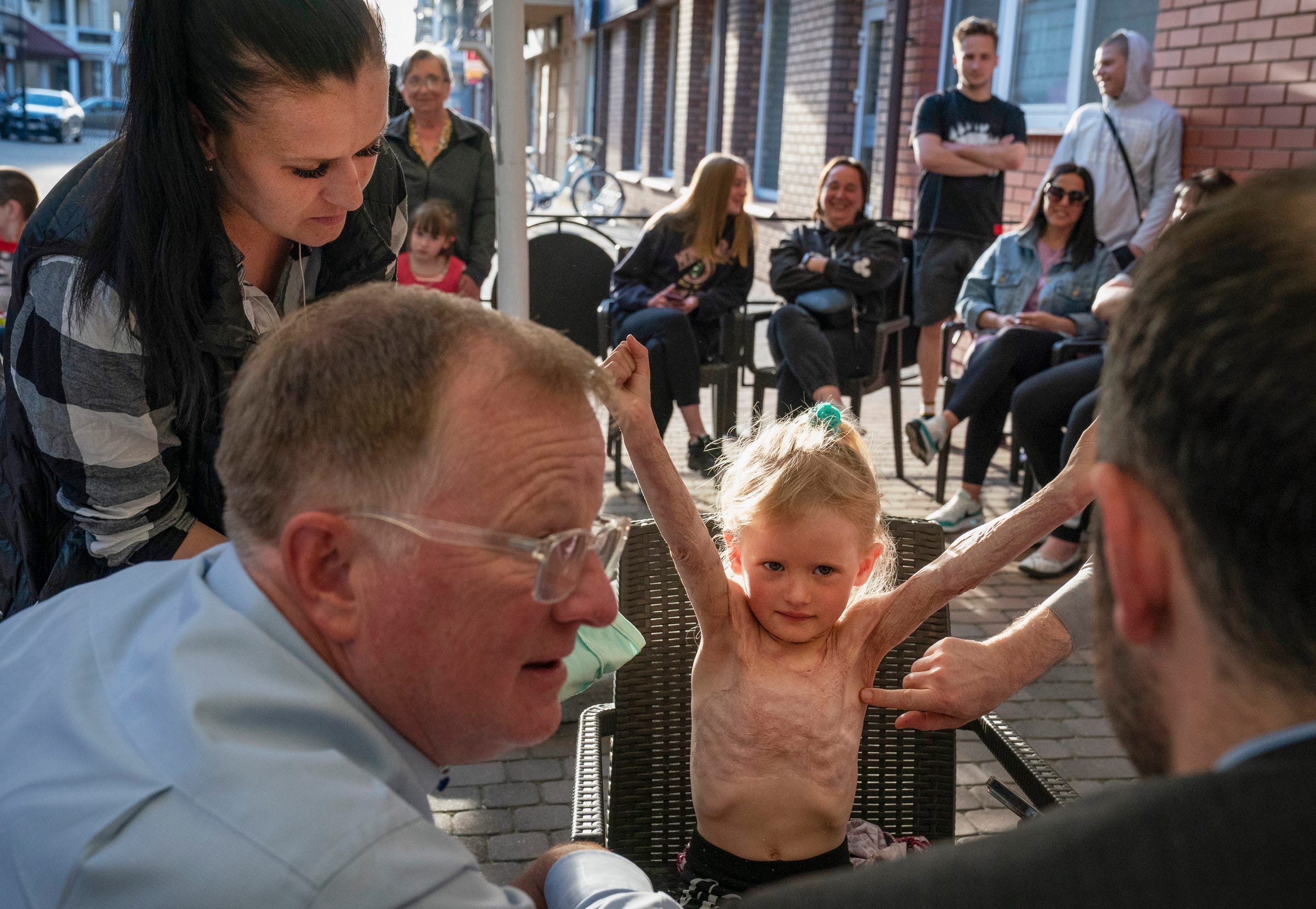
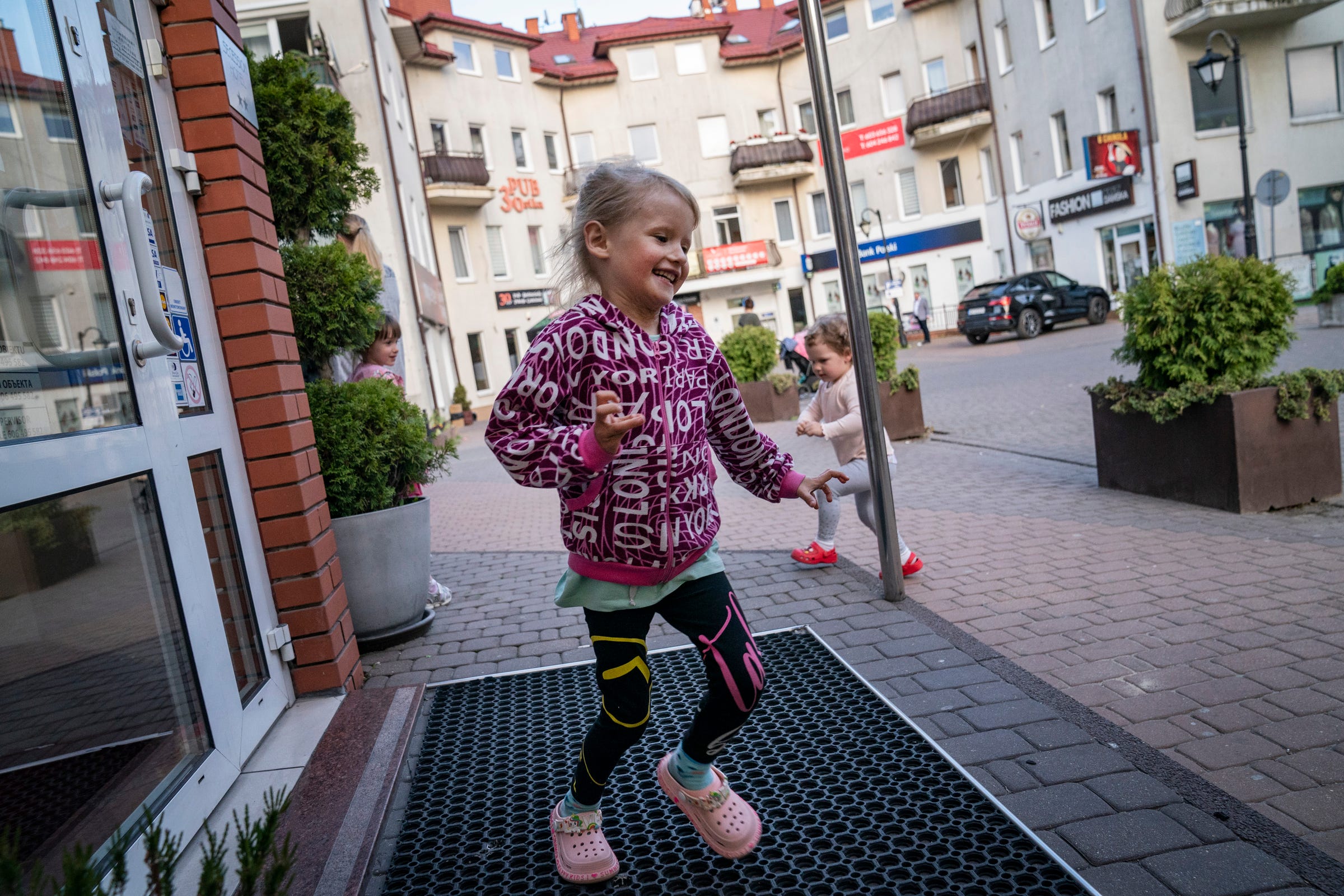
That’s when the pop of a balloon prompted visceral reaction among the group.
“No! no! no!” one of the mothers said, shaking her head and looking frantic. It sounded a little too much like gunfire.
If it bothered Liza, she didn’t seem to show it. A moment later, her shirt was back on, and Liza ran off to play with 2-year-old Viktoriia Kaleushchenko from Kharkiv, who was born with an anomaly on her left foot.
“She has toes pointing outward, and in the future, we will not be able to properly put on shoes," said her mother, Tatiana Kaleushchenko. "And due to improper walking, the knee and hip joint will be disturbed."
Encountering a familiar face
When it’s 6-year-old Evheniia Ukhvatova’s turn to sit in the chair, she instead is placed standing in the seat, facing away from the doctors.
That’s because the burns are on the back of Evheniia’s legs and feet. She took off her socks, and the doctors pushed up her striped pink and white leggings so they could get a view of the tight scars and contractures that are making it increasingly difficult for Evheniia to walk.
“That’s tight. It’s going to be a wound issue,” Diamond said after examining her calves. The medical team agrees to release the contracting scar tissue on both her lower legs. She’ll get a laser treatment, too, to soften the scar tissue as part of a surgery that should last about 2½ hours.
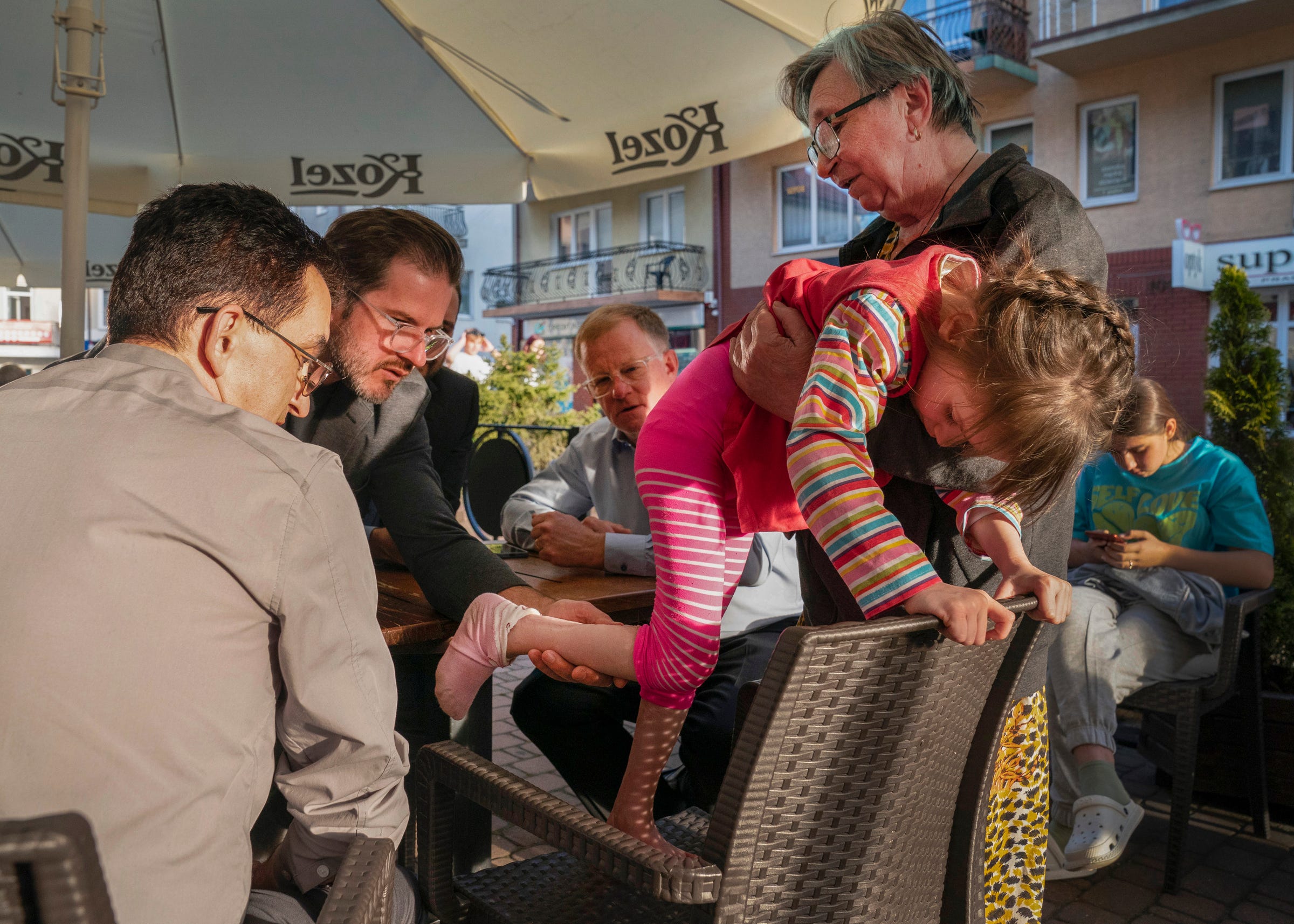
Evhennia has befriended a much older boy at the hotel. His name is Volodymyr Bubela, and he’s 17 and lives in Lviv.
When Diamond says his name, Fuzaylov looks at the boy in the chair and does a double take. He recognizes this boy – who has grown a lot since Fuzaylov last saw him.
Volodymyr’s burns were so severe when he was a boy that he was taken to the U.S. for treatment for six months. Since then he has had several repeat surgeries.
Fuzaylov affectionately ruffles Volodymyr’s ruddy hair. “You’ve grown so much,” he says.
Brown asks Volodymyr what he’d most like repaired this time. The boy has many problems that could be improved, but the doctors can do only so much this time, with so many children and so little time.
The boy explains that it has become very difficult to turn his head. Diamond notices how difficult it is for Volodymyr to open and close his right hand, the only one with much function.
The teen asks for surgery on his left elbow, too, because it is tight and difficult to bend or straighten, the right side of his neck and his right hand.
“Let’s do as much as we can,” Fuzaylov says, and the surgeons nod in agreement.
They always do.
Zuza Nikitorowicz translated interviews for this story. To contribute to Doctors Collaborating to Help Children, go to dctohc.org/donations.